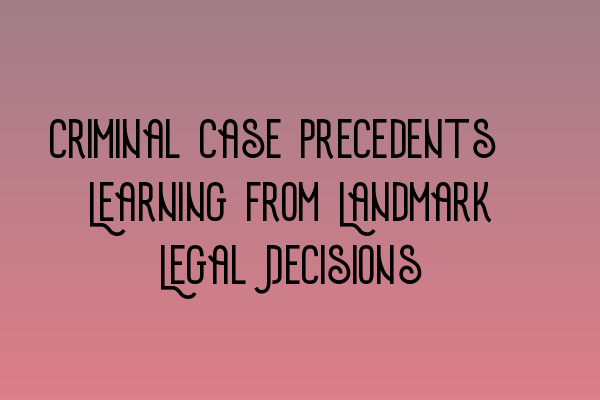Criminal Case Precedents: Learning from Landmark Legal Decisions
Welcome to the SQE Criminal Law & Practice Law UK blog, where we provide valuable insights and updates to help aspiring criminal law professionals stay informed and excel in their careers. In this blog post, we will explore the significance of criminal case precedents and the lessons we can learn from landmark legal decisions.
The Power of Precedents
Precedents, or legal cases that serve as examples or guides for future decisions, play a crucial role in shaping the criminal justice system. They establish principles, interpretations, and legal standards that guide judges, lawyers, and practitioners in their understanding and application of the law. By examining landmark criminal case precedents, we can gain valuable insights into legal strategies, argumentation methods, and the evolving dynamics of criminal law.
Learning from Landmark Legal Decisions
Landmark legal decisions are those cases that have had a significant impact on the development of criminal law. These cases often involve complex legal issues, high-profile defendants, and critical questions about the interpretation and application of the law. By studying these landmark rulings, criminal law practitioners can gain a deeper understanding of legal reasoning, the art of persuasion, and the intricacies of the criminal justice system.
Let’s explore some notable criminal case precedents and the lessons we can learn from them:
R v. Murray (1985)
The R v. Murray case, which involved the interpretation of the defence of duress, provided important insights into the challenges faced by defendants who claim duress as a defense. This case highlighted the need for a more balanced approach in evaluating the circumstances and pressures faced by the accused. As criminal law professionals, understanding the interpretation of duress in this landmark case can help us construct effective arguments and defenses for our clients.
Workshops and Seminars on Criminal Practice: Expanding Your Expertise
Continuous professional development is essential for criminal law practitioners to stay updated with the latest legal developments and enhance their expertise. Workshops and seminars provide an excellent platform for networking, knowledge sharing, and skill development. Explore our article on Workshops and Seminars on Criminal Practice: Expanding Your Expertise to discover opportunities to expand your legal knowledge and professional network.
Updates in UK Criminal Laws: Staying Informed and Prepared
To navigate the complex world of criminal law, staying informed about the latest updates and changes in legislation is crucial. Our article on Updates in UK Criminal Laws: Staying Informed and Prepared provides valuable insights into recent legal developments that can impact your practice. Stay ahead of the curve and ensure you are well-prepared to defend your clients’ interests.
Enhancing Your SQE Criminal Law Study Group Experience
Preparing for the SQE Criminal Law exam requires diligent study and effective learning strategies. One powerful way to enhance your study experience is by joining a study group. Our article on Enhancing Your SQE Criminal Law Study Group Experience provides tips and guidance on optimizing your study group dynamics and leveraging collective knowledge to succeed in the exam.
Decoding Criminal Evidence Rules: A Detailed Analysis
The rules and principles regarding the admissibility and presentation of evidence are critical in criminal trials. Our article on Decoding Criminal Evidence Rules: A Detailed Analysis offers a comprehensive breakdown of the rules related to criminal evidence and provides insights on how to effectively navigate evidentiary challenges in criminal cases.
Ensuring Rights of Victims in Criminal Procedures: Legal Protections and Support
While the rights of defendants are crucial to the criminal justice system, it is equally important to ensure the rights and well-being of victims. Our article on Ensuring Rights of Victims in Criminal Procedures: Legal Protections and Support discusses the legal protections and support available for victims of crimes, underscoring the need for balanced and fair criminal procedures.
Conclusion
By studying criminal case precedents and landmark legal decisions, we can deepen our understanding of the law and refine our skills as criminal law professionals. The insights gained from these cases can contribute to effective legal strategies, improved client representation, and ultimately better outcomes in the criminal justice system.
For more resources and updates on criminal law practice, check out our related articles:
Workshops and Seminars on Criminal Practice: Expanding Your Expertise,
Updates in UK Criminal Laws: Staying Informed and Prepared,
Enhancing Your SQE Criminal Law Study Group Experience,
Decoding Criminal Evidence Rules: A Detailed Analysis, and
Ensuring Rights of Victims in Criminal Procedures: Legal Protections and Support.
